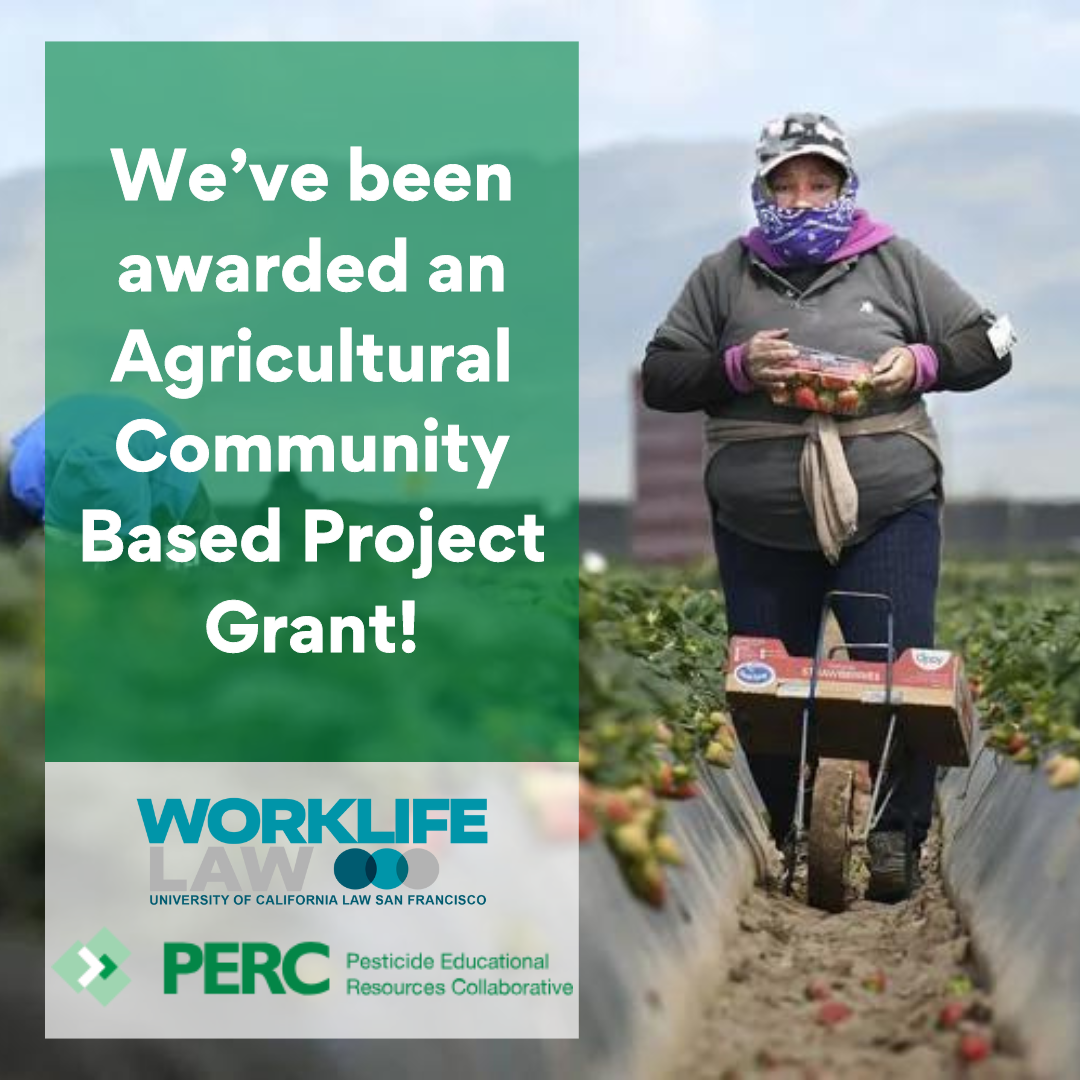 The Center for WorkLife Law is thrilled to announce that our team has been awarded a $150,000, one-year Agricultural Community-Based Projects (AgCBP) grant from the Pesticide Educational Resources Collaborative (PERC). WorkLife Law’s initiative, Dar a Luz: Legal Rights for Farmworkers in Pregnancy and Postpartum, a partnership with Central Coast United for a Sustainable Economy (CAUSE), breaks down barriers faced by California farmworkers during pregnancy and postpartum.
The Center for WorkLife Law is thrilled to announce that our team has been awarded a $150,000, one-year Agricultural Community-Based Projects (AgCBP) grant from the Pesticide Educational Resources Collaborative (PERC). WorkLife Law’s initiative, Dar a Luz: Legal Rights for Farmworkers in Pregnancy and Postpartum, a partnership with Central Coast United for a Sustainable Economy (CAUSE), breaks down barriers faced by California farmworkers during pregnancy and postpartum.
Through this grant, WorkLife Law will develop new programming and practical resources to equip community health workers – such as promotoras, social workers, and WIC counselors – to support farmworkers in taking paid time off work to prevent prenatal pesticide exposure.
The training will encompass the workplace legal rights of farmworkers during pregnancy, postpartum, and breastfeeding as well as guidance on navigating California’s paid leave programs. Trainees will also walk away with a comprehensive toolkit to reference in their day-to-day interactions with farmworkers. WorkLife Law’s dedicated free legal helpline for farmworkers will provide tailored legal assistance, in Spanish and Indigenous languages, when additional support is needed.
Despite the devastating health risks associated with prenatal pesticide exposure, many farmworkers continue to work throughout their pregnancies to provide for their families. The Center for WorkLife Law’s proposed project aims to expand the capacity of its established Dar a Luz initiative, seeking to break this cycle that significantly impacts the health and well-being of California’s farmworker community.
The Center for WorkLife Law works toward a future where no one is forced to choose between providing care for their loved ones and keeping the paying job they need to survive.
“We are deeply honored to have been selected by PERC to receive funding for this life-changing project,” said WorkLife Law Co-Director Liz Morris. “This grant will allow us to strengthen our commitment to advocating for the legal rights of farmworkers, ensuring they receive the protections and support they need to maintain a healthy pregnancy.”
“It is imperative that farmworkers in California not only know their rights during and after pregnancy, but have meaningful support in accessing them,” said WorkLife Law Senior Staff Attorney Juliana Franco. “Thanks to PERC’s generous funding, Dar a Luz will ensure that community health workers – and the farmworkers they assist – have the resources and support they need when navigating California’s employment protections and paid leave programs.”
“The project by the Center for WorkLife Law is profoundly meaningful,” said Emily Ripken, Project Coordinator for Agricultural Community-Based Projects at the University of California Davis. “By equipping community health workers and providing direct legal assistance to pregnant farmworkers who need additional support, this program truly makes a significant impact.”
The AgCBP initiative highlights PERC’s commitment to promoting the health and safety of farmworkers, pesticide handlers, and their communities. Through the AgCBP program, PERC supports innovative projects that tackle pressing challenges and contribute to a safer agricultural environment.
About PERC
PERC is the Pesticide Educational Resources Collaborative, a 5-year cooperative agreement between the EPA’s Office of Pesticide Programs and University of California Davis Division of Continuing and Professional Education, in collaboration with Oregon State University.
For more information on the AgCBP grant, visit https://www.pesticideresources.org/agricultural-community-based-projects.